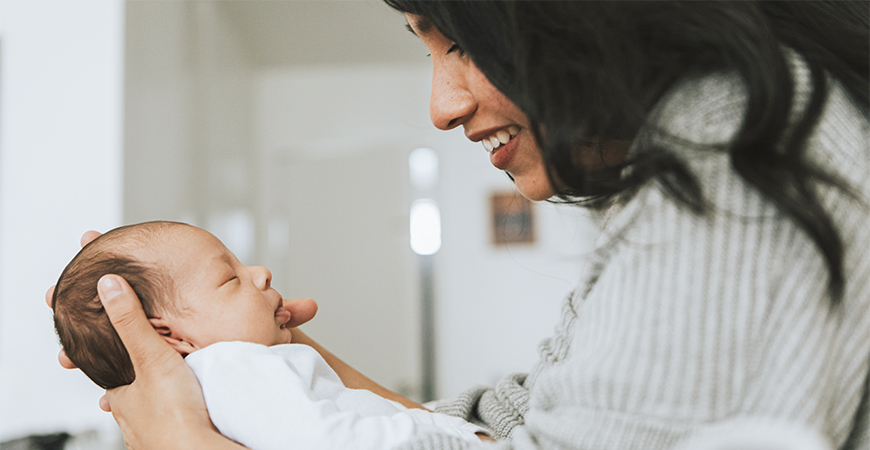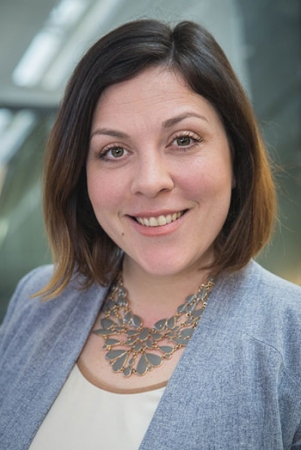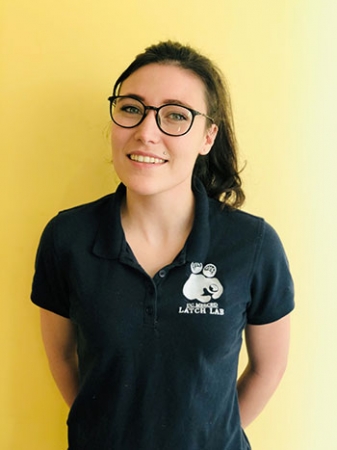
Health psychology Professor Jennifer Hahn-Holbrook and incoming grad student Jessica Marino have a new study suggesting that the breastmilk of mothers who have recovered from COVID-19 contains strong antibodies to the virus.
In the fight against the global pandemic, there is an urgent need to identify factors such as SARS-CoV-2 specific antibodies in milk that may help confer immunity, particularly for vulnerable newborns, the researchers said.
Because human milk contains high levels of these secretory-type antibodies, breastfeeding by mothers who recover from COVID-19 could pass on immunity to babies, and there’s a chance the purified milk antibodies could be a therapy for adults suffering from COVID-19.
Hahn-Holbrook’s research focuses on breastfeeding and Marino, who graduated from UC Merced with a degree in psychology in 2016, has been the driver of this project. As a graduate student in the Health Psychology Ph.D. program, Marino concentrates on the development and expression of maternal behavior. She plans to study how hormones affect maternal behavior and the intergenerational effects that mother-child relationships can have on health. Her ultimate goal is to find protective maternal factors that might mitigate health risks in vulnerable children.
Marino and Hahn-Holbrook, with the Department of Psychological Sciences, answered a series of questions about their breastmilk-antibody study:
What was the original research question you asked? Did you already know that breast milk contained SARS antibodies?
When moms get sick, breast milk sometimes contains antibodies to help infants fight off that particular disease. Antibodies help your immune system recognize and destroy pathogens like COVID-19. But COVID-19 is a completely new disease, so, before we did this study, no one knew whether breast milk from mothers who recovered from COVID-19 would contain antibodies. Perhaps more importantly, we also wanted to do this first study of COVID-19-specific antibodies in milk to see exactly the type of COVID-19 antibodies that are present, because some types of antibodies provide more powerful protection than others.
Were you surprised at the results?
We were happy but not surprised to see that all mothers who recovered from COVID-19 had antibodies for COVID-19 in their breast milk. This is good news because it opens the door to using breast milk from COVID-19-recovered mothers to treat critically ill babies or prevent severe illness in vulnerable infants. While our small study of 15 moms only gives us a snapshot of what is likely a dynamic immune response, it provides good reason to continue exploring the power of human milk to treat or prevent COVID-19 in infants. We were also pleased but not surprised to find high levels of a special type of antibody in milk called sIgA, which is especially good at fighting diseases that attack the lung lining such as COVID-19.
One thing that surprised us was that we found immune compounds that responded to COVID-19 even in the milk of mothers in our control group who were never infected with COVID-19. This suggests that breast milk may have some general immune properties that help babies fight COVID-19, even if mothers have never been infected with the disease.

Who else was involved with this study?
This study is a collaboration between Mount Sinai Hospital in New York and UC Merced researchers. Dr. Rebecca Powell, a virologist at Mount Sinai Hospital at the epicenter of the outbreak in New York City is leading the study, working with Alisa Fox, Florian Krammer, and Susan Zolla-Pazner.
What were your roles, exactly?
I’m a scientist but I’m also the breastfeeding mom of a 6-month old baby boy, Wilder, so I really wanted to do a study looking at antibodies in breast milk for COVID-19. But as a psychologist, I didn’t have all the experience required for the project. So, I immediately reached out to Dr. Powell when I saw that she was doing research on antibodies for COVID-19 in human milk and asked how we could help. As psychologists who have been doing research on human milk for years, Ms. Marino and I offered to help with the human side of the study. Our team at UC Merced has been helping to locate, track and manage the logistics of home-milk collection on what has turned into a huge study of over 1,600 women across the U.S. who are storing milk for this study. Our UC Merced team is also helping to create online surveys that will be sent to participants and helping to write up the results for publication. We leave all the antibody testing to the expert virologists.
"We were happy but not surprised to see that all mothers who recovered from COVID-19 had antibodies for COVID-19 in their breast milk. This is good news because it opens the door to using breast milk from COVID-19-recovered mothers to treat critically ill babies or prevent severe illness in vulnerable infants."

What are the next steps in determining whether these antibodies are suitable for treatment and/or vaccines?
The hope is that we can use milk from COVID-19-recovered mothers to help treat infants fighting COVID-19. Research still needs to be done to see how effective human milk antibodies are as a treatment and to identify potential risks. For example, we do not know if the milk from COVID-19-recovered mothers might still contain the virus that could actually cause or worsen the infection. Theoretically, milk antibodies could be purified and used to treat adults, although there is more testing that needs to be done to see if this is a possibility.
Milk antibodies would probably not be used to help develop vaccines. Antibodies from the blood of recovered patients is already being used to treat COVID-19. The next step is to compare the effectiveness of antibodies in milk to those found in blood, because they are quite different. Milk contains much higher levels of sIgA than plasma, and sIgA is especially helpful at protecting the lungs. So, it is possible that milk antibodies might be even more effective in treating COVID-19 than antibodies from plasma. Also, milk contains way more antibodies than blood by volume, so we could potentially treat more people with fewer donations.
The next step is to get a larger sample to make sure the types of antibodies we observed in our first 15 donor moms are present in most women. Dr. Powell also plans to test how well milk antibodies fight COVID-19 in cells and to try to distill milk antibodies to use them as a treatment. At UC Merced, we hope to do epidemiological work to determine how factors such as demographics, stress and depression predict milk antibodies. This work will help us answer basic questions about how mom’s environment and social world impact the immune cells in her milk. We know that other groups are also looking into whether COVID-19 can be transmitted through milk, as this is a potential risk of using human milk as a treatment.
If it bears out that the milk antibodies could become a treatment, how soon could it be in general use?
While there is good reason to be hopeful about breast milk as a coronavirus treatment for infants, we are many steps and funding dollars away from developing an effective therapy. But this could turn out to be really important for treating COVID-19 in the developing world, because people can easily get milk from recovered moms even if they don't have other treatments available
One real concern in using raw (unrefined) breast milk as a treatment is whether milk from recovered mothers might contain the active virus and actually worsen or cause infection. The science on this is being done and we should know soon how much of a transmission risk there is with breast milk. If the risk of infection is low, the good news is that it would not be that difficult to source milk from COVID-19-recovered donors through a strong, global recruitment campaign, especially given the ever-increasing number of infections worldwide. Because milk contains much higher levels of antibodies than plasma, we could also treat more infants with less milk than we could if we only rely on plasma donations. Using human milk antibodies as a treatment for adults is farther off because we still need to figure out how to refine the milk antibodies and we know much less about how well adults react to milk antibodies.
Lorena Anderson

Senior Writer and Public Information Representative
Office: (209) 228-4406
Mobile: (209) 201-6255






